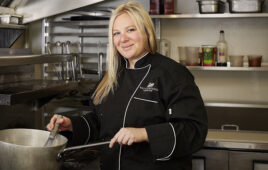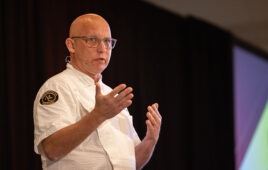Having spent the better part of fifteen years growing up in commercial kitchens, there was always this odd sense of pride around not taking time off. It was like some weird badge of honor that chefs wore on their coats. I remember being in my teens and hearing the chefs above me talk proudly about leaving their vacations on the table because there was no time for such things.
Like many of you, I grew up watching and following chefs who traveled around the world in the pursuit of experiencing and touching new cultures. I don’t remember any of those chefs ever saying at the time that I would need to give up my freedom to do what I do. Those chefs took the time away from their kitchens to experience new and exciting things, broaden their perspective, and get away from grinding every day inside four walls. These experiences allowed them to breathe new life into their kitchens and teams and allowed them to keep their offerings fresh and current. It also allowed them to recharge and refresh so they could be that focal point of energy that the rest of their team fed from when they walked back into the kitchen.
This is why I have always strived to have an excellent work-life balance for myself and our culinarians in our kitchen at Sycamore Hills GC. When that can be achieved, it dramatically affects three things. The first is our mental health. The second is our relationships with friends, family, coworkers, and loved ones. The last may surprise you. It can have a dramatic effect on the membership of your club.
Our mental health directly impacts our love and drive for what we do. Lately, this has been a hot topic of conversation in our industry – but even more so since the pandemic. Just sit back and think of all our responsibilities. We have to control many things, such as our resources, team members, culture, and in my opinion, most importantly, our standards and expectations. When you add all that up, even the most mindful person can get tired, overwhelmed, and burned out.
I love my operation. It’s one of my biggest passions. Even with all that passion, I need to give my mind and body a chance to recharge and reset. Whether that be a short one-night, two-day trip to Chicago or taking forty-five minutes to work out during the season, these things give my mind a break and my body a chance to reset. I know I need this separation to be the type of leader my organization and team need me to be. This also allows all of the culinarians under my tutelage to see that they can be successful and fulfilled in their careers without giving up most of their lives to achieve their dreams.
We have all been in a kitchen where the leader is always tired and burned out. Imagine what the next generation of culinary superstars sees and feels when they experience a burned-out leader. Most likely, they wonder if this is what they want. A burned-out chef is a vampire to aspiring culinarians.
Our minds are incredible in giving us infinite possibilities to help us succeed and achieve our goals. If we don’t take the time to recharge our minds, we are not allowing ourselves to reach our fullest potential.
I’m sure we all have used the cliché “family first” at some point in describing ourselves. Please take a second and think how hard it is to live that statement in our industry. Sure, we all go home at the end of the long day, but at that point, how much do we have left in the tank to give to our loved ones?
Wearing the title of Chef (or any other title in a commercial kitchen) is a dominant force in defining who we are and the lifestyle we have to lead to experience success along our chosen career path. However, we owe it to ourselves and our loved ones to disconnect from our kitchen and reconnect with our families. Even though time off and life balance are becoming more prevalent in our industry, we will still spend many nights, weekends, and holidays in our kitchens and away from our families.
How do we combat the requirements of our positions and their impact on our families? I have found that I must remind myself to “be present” even when I am not at the club. What do I mean about being present? It’s easy to go home and hole up in a room alone or do an activity by ourselves with the quick excuse of, “I need me time; I deal with people and stress all day.”
By doing this, we are disconnecting from our work life but amplifying that disconnect with our loved ones. Most of us have patient loved ones who understand that providing for our families requires more than typical banking hours during the week. Please take a second to think about how that disconnect makes the rest of your family feel when you spend time with them outside the typical work requirement and choose not to spend those precious hours with them.
Having a wife and a young daughter, I know how significant even small amounts of time spent with them are. Something as simple as sitting down and taking the time after work to watch a movie with my wife instead of worrying about catching up on sleep, or getting some me time, can profoundly affect our relationship and her overall happiness. The same goes for my young daughter. I don’t typically get to my kitchen till around lunchtime. I could sleep in, work out, putter around with some personal hobbies, but I wake up early to spend quality time with my daughter. I often don’t get home until after she’s in bed. Even though I am disappointed on those nights due to my work schedule (and missing her and my wife), I know she has already logged some great memories with her Dad that morning, which gives me solace (which in turn helps my mental health).
Sometimes you have to get creative. Occasionally I have to go into my GM’s office during the season to tell him I need to get away for a day to spend time with my family. I’m fortunate to work for incredible leaders who believe in and share my philosophy. I also make sure to time it so it doesn’t have a massive impact on the club. So as hard as it is to make that ask with what has been ingrained in us in this industry, it’s tremendously crucial on many levels.
This year I got creative and decided to take my wife to the annual Chef to Chef Conference in Miami. This accomplished two things. First, it gave my wife some time to herself while I was attending the conference (time alone is something she never has due to our young daughter). Second, we tagged on a short cruise after the conference. This allowed me to save on travel time by not having to come back to where we live to leave again to spend time with my spouse. This was an incredible experience for both of us, and I encourage any of you to bring your spouse to The Chef to Chef Conference in Austin next year and take a few days on the back end to spend some quality time together.
The last one, which could be the most important when looking at your potential success in your kitchen, is your club membership. If you don’t allow yourself to experience genuine hospitality, how can you give that experience to someone else? We have a saying at Sycamore Hills – we want to help our members create incredible memories with friends and family while at the club.
You can’t help someone achieve great memories when you don’t know how to make great memories.
My memories, whether those be experiences at Michelin-star restaurants or as simple as trying street food, have given me new knowledge to bring back to my kitchen to help our members make incredible memories. One of the great perks I have in my position is a monthly dining allowance. This allows me to go out and try what’s new and hot in Fort Wayne, the Midwest, and when traveling with my wife to wherever our next vacation takes us. I look at each experience as creating a great memory with my wife, but I also research to see what I should bring back to my kitchen for our membership to experience. This has been an incredible tool for me as our culinary leader, and I encourage other chefs to talk to their leadership about a dining allowance for themselves.
I am fortunate to work for an incredible membership and leadership team that believes in time off for the betterment of myself and my family. But I realize that my situation sets the bar and that we should be an example for our industry so that other chefs begin to take time off for ourselves, our relationships, and those we serve.




